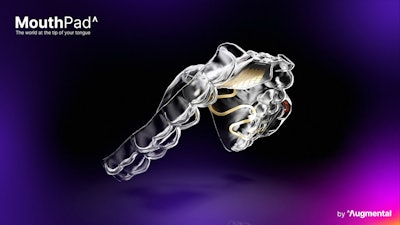
MIT Media Lab spinoff Augmental, a hardware startup focused on creating human-first experiences that enhance everyday interactions with digital devices and interfaces, today announces the launch of the MouthPad^ — a device that allows people to control devices purely through the movement of their tongue. The hardware company's first device aims to push the boundaries of hands-free computing.
The smart intra-oral interface is customized to the user's mouth and comes with the ability to connect to several personal devices.
While eye-tracking technology, 'pure' voice assistance, and even lip-controlled joysticks all offer degrees of hands-free access to the digital world, users can be left frustrated, fatigued, or with damage to their teeth. There is a clear need for more technological innovation regarding how we control current and forthcoming digital devices without our hands.
"As our lives become increasingly intertwined with technology, and the world expands from the physical to the digital, it's more important than ever to ensure that everyone has equal access to control inputs and new interfaces," said Tomás Vega, Co-Founder and engineer at Augmental. "Interactions with these systems must be designed to cater to how humans perceive, process, and act."
Led by principles of universal design and inclusivity, Augmental launched an R&D program focusing on the needs of people with limited hand control. By working with the disability community, Augmental gained invaluable insights that helped inform the development of the device. The goal is to scale up the MouthPad^ so that it can be used by the broadest possible audience, allowing people to carry out everyday tasks hands-free and enjoy digital control with greater ease and independence.
"Universal design has the power to greatly expand digital access for everyone, not just those lacking mobility. In exploring hands-busy scenarios and contexts in which users have limited hand control, we have developed an in-mouth platform that enables convenient device interaction today, while also setting the stage for a future of more human and less distracting heads-up displays," said Corten Singer, Co-Founder and engineer at Augmental. "Our technology should meet us where we are — not the other way around."
Though the MouthPad^ has been found to address relevant needs for people with quadriplegia and limited hand control, its reach extends beyond these cases as assisting those in 'hands-busy' scenarios to enhance productivity and performance of surgeons, gamers, astronauts, lab technicians, factory-line workers, etc. When it comes to how this technology could be applied — and improved — the possibilities are endless, especially as the promise of augmented reality approaches.
"It is very exciting to see this technology becoming widely available, not only because it can empower millions of differently-abled individuals, but also because as digital access becomes ever more important in our lives, there will be a need for novel, more seamlessly integrated methods for device interaction. I applaud the Augmental team for exploring creative new opportunities." Pattie Maes, MIT Media Lab Professor and director of the Fluid Interfaces Group.
How it Works
Designed to allow users to speak freely and perform other actions in parallel, the MouthPad^ is complementary to alternative technology such as voice control, allowing people to seamlessly switch between tongue-driven screen navigation and speech without the need for surgery.
"In my previous roles, I worked on invasive implants for brain-computer interfaces, and I realized that these innovations were going to help a lot of people. But in talking with friends who would most benefit from these technologies, I realized that most of them wouldn't undergo a surgical procedure in order to interact with computers," said Vega.
The MouthPad^ harnesses the innate dexterity of the tongue — considered by Augmental as "the 11th finger." The device converts the user's tongue position and pressure into cursor actions by processing signals through a machine-learning algorithm inside its processor. The commands are then sent via Bluetooth to the connected device and translated into cursor movements and clicks, allowing the user to do everything from simply sending an email or turning on the lights, to editing a photo or playing a video game.
Each device is fully personalized to the user through a process of intra-oral scanning that generates a 3D model of the mouth. Using this model, a custom device is designed and printed with dental resin. This perfectly fits the individual's mouth and encapsulates a flexible circuit board with sensors, a processing unit, and a Bluetooth radio — all sealed in a watertight casing with an innovative technique to protect the electronics from saliva. This "wet touchpad" - smart enough to deal with issues introduced by saliva and other liquids - in combination with the fact that it can connect with several devices via Bluetooth, makes the MouthPad^ a game-changing piece of technology.
"I'm motivated about augmenting human ability, and interested in using technology to overcome all the limitations of the way we are born," said Vega.






















